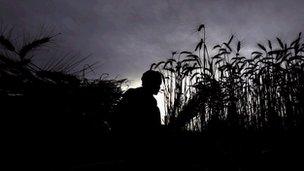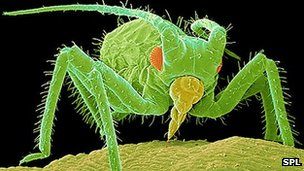GM wheat trial at Rothamsted vandalised
- Published

Some scientists say GM wheat could help reduce pesticide use
A man has been charged with criminal damage following a break-in at the Rothamsted Research centre where a trial of GM wheat is being held.
Rothamsted said that crops had been vandalised, causing "significant" damage.
The incident took place on Sunday morning at the centre's test site in Harpenden, Hertfordshire.
The project aims to see whether the modified crops can deter aphids - a major wheat pest.
Rothamsted has previously pleaded with anti-GM campaigners not to destroy their experimental plots, which they say could help reduce pesticide use.
But opponents of GM technology claim that planting the crops in the open air would allow modified pollen to get out into the surrounding environment.
After the break-in at the site, Rothamsted scientist Toby Bruce <link> <caption>wrote on Twitter</caption> <url href="http://twitter.com/#!/toby_bruce" platform="highweb"/> </link> that wheat seeds appeared to have been strewn onto plots, and the tops of plants had been cut off.
However, the laboratory said the account was anecdotal and might not be accurate. In a statement, Rothamsted commented: "The intruder caused significant, random property damage, but failed to disrupt the experiment in this attack."
The lab's director Prof Maurice Moloney said the act was an attempt to "deny us all the opportunity to gather knowledge and evidence" on a possible new approach for reducing the use of pesticides.
A 50-year-old man from Devon is to appear at the Central Magistrates Court in St Albans on 13 July.
'Picnics and decontamination'
The crop being trialled at Rothamsted contains genes synthesised in the laboratory. It will produce a pheromone called E-beta-farnesene that is normally emitted by aphids when they are threatened by something.
When aphids smell it, they fly away.
Anti-GM group Take the Flour Back has vowed to "decontaminate" the site unless the research is halted.

Aphids are a major threat to cultivation in the UK and other countries
The event was trailed on the organisation's website as "a nice day out in the country, with picnics, music... and a decontamination".
There is no suggestion the man who has been charged is linked to Take the Flour Back.
Eleanor Baylis, from the anti-GM group, said in a statement: "We have no information about this incident, but are relieved if the quantity of GM pollen released from the trial has been reduced.
"The British people are clear that they're not swallowing this technology."
The protesters have previously declined an invitation from Rothamsted to meet scientists behind the project and, following a heated debate on the BBC's Newsnight programme, a planned day of action on 27 May will go ahead.
But a spokeswoman for Take the Flour Back told BBC News the group would be interested in engaging in a public debate with wide participation. She said the decision not to take part in the debate proposed by Rothamsted was due to the specific conditions of the event.
Paul.Rincon-INTERNET@bbc.co.uk
- Published2 May 2012
- Published17 April 2012
- Published28 March 2012
- Published24 February 2012